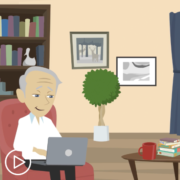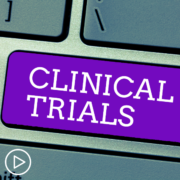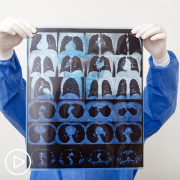Small Cell Lung Cancer Care | Optimizing Team Communication
Small Cell Lung Cancer Care | Optimizing Team Communication from Patient Empowerment Network on Vimeo.
How can small cell lung cancer team communication be optimized? Expert Beth Sandy from Abramson Cancer Center shares advice for communication between care team members and for setting expectations about symptom management and treatment plans.
[ACT]IVATION TIP
“…don’t feel afraid or scared to ask the questions that you want the answers to. And if you do, it’s okay to change providers, to be honest with you, because you should have that level of trust and ability to be open with your provider.”
See More from [ACT]IVATED Small Cell Lung Cancer (SCLC)
Related Resources:

|

How Can Small Cell Lung Cancer Patients Ask About Care Goals |

|
Transcript:
Lisa Hatfield:
So, Beth, how do you facilitate open and transparent communication between oncology nurses, patients, and their families and care partners to address concerns and set realistic expectations to ensure that everyone is on the same page regarding the symptom management and treatment plans?
Beth Sandy:
Yeah. So again, this is something that happens over time and I think it’s really important for patients to feel comfortable with their providers. If you don’t feel that you can ask your doctor or your nurse practitioner or your nurse, whoever you’re seeing, if you don’t feel comfortable that you can ask questions about your treatment and your disease, that’s a problem. You should have a good relationship with them. I feel like us in oncology as opposed to other fields like dermatology or whatever, I think we have a more personal relationship with them because this is a disease that often they’re dealing with for a long time and we want to make sure that we’re doing what’s best for them, what’s best for the patient.
So sometimes for me, again, I’ll say, how are you tolerating the treatment? Are you in bed a lot at home? Or are you feeling pretty good on the treatment? And then a lot of that too will partially be, well, the treatment is working very well. Are you willing to stay on it based on the side effects you’re having? But for me, it’s so much easier if the patient starts the conversation and says something along the lines of like, “I’m not tolerating this well, I’m not feeling well. Is there something more we can do? Or can we give less chemo?” Patients ask me that all the time.
And then we have a discussion about the pros and cons of that. So everything’s a discussion. Oncology is not black and white. There is gray area that we can work with you to improve your quality and be open about how much you want to know. Do you want to know exact numbers of your chances of survival? Do you want to know exact numbers of exactly how often this exact chemo works for other patients? We can give you those, but we don’t have to. So we really want to, for the most part, always instill hope, because I’ve seen lots and lots of miracles and great stories with patients who have done way better than I ever thought they would. So I would hate to say to someone, oh, this is the average when lots of my patients will do better than that.
So I think my activation tip here is don’t feel afraid or scared to ask the questions that you want the answers to. And if you do, it’s okay to change providers, to be honest with you, because you should have that level of trust and ability to be open with your provider.
Share Your Feedback:
Create your own user feedback survey










